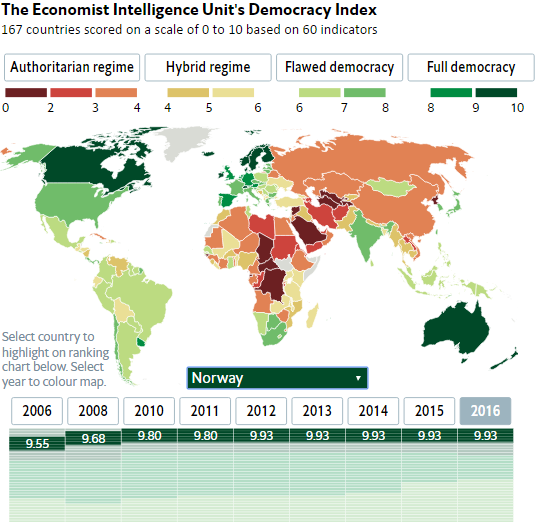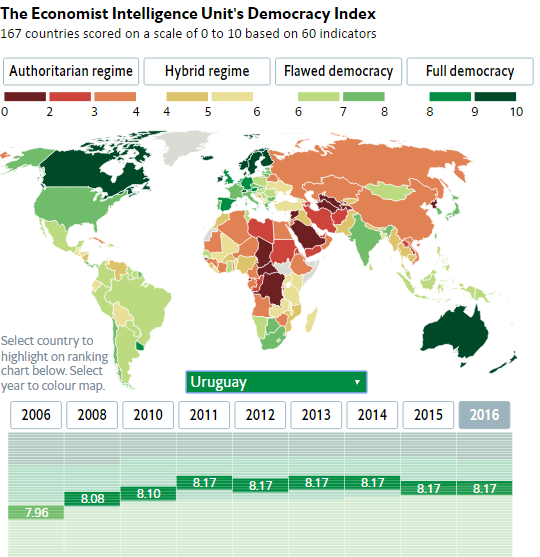Which are the world's strongest democracies?

Image: REUTERS/Michaela Rehle
Stay up to date:
Global Governance
Democracy is in decline.
The Economist Intelligence Unit’s (EIU) latest Democracy Index 2016 shows 72 countries experienced a decline in democratic values last year. Countries with declining levels of democracy outnumbered those becoming more democratic by more than 2 to 1.
The EIU’s Democracy Index measures the state of democracy by rating electoral processes and pluralism, the state of civil liberties, the functioning of government, political participation and political culture in more than 160 countries worldwide. The EIU’s ranking shows the average global democracy score in 2016 fell to 5.52, down from 5.55 in 2015 (on a scale of 0 to 10).

Norway leads the world’s democracies
Norway leads the Index as the world’s strongest democracy, followed by Iceland and Sweden. New Zealand comes fourth, with Denmark in fifth and Canada and Ireland in joint sixth place. Switzerland, Finland and Australia round off the top ten of “full democracies.”

Less than half the world lives in a democracy
The report finds that less than half (49%) the world’s population lives in a democracy of some sort, and only 4.5% reside in a “full democracy.” This is a steep decline from 2015, when it was just under 9%.

The US is now a flawed democracy
This dramatic decline is primarily down to the US having been demoted to a “flawed democracy,” in the classification of the EIU - as a result of low public confidence in the government. The report stresses that this was strongly in evidence prior to the presidential election that saw Donald Trump become president. Similar trends were also in evidence in many other developed economies.

Political participation increases as Britain shows the EU the red card
While disenchantment with political elites has led to a rise in populism, it has also sparked renewed political participation. In the EU referendum, 72% of the UK population turned out to vote, compared to an average of 63% in general elections over the past decade. This reversed a trend toward growing political apathy. The UK also saw a marked increase in membership of political parties. As a result, Britain’s democracy score has gone up from 8.31 (out of ten) in 2015 to 8.36 this year, placing it 16th among the “full democracies.”

Eastern Europe questions the benefits of democracy
The former communist bloc in Eastern Europe has experienced the most significant regression recorded since the Democracy Index was launched in 2006. There is widespread disenchantment with democracy, with 18 countries in regression on its democratic trajectory and the remaining nine stalling to various degrees.
Estonia ranks the highest, at number 29. However, the EIU points out that there is not a single country which achieves ‘full democracy’ ranking, even though 11 of the countries surveyed are EU members. The most noticeable decline was in the rating of electoral processes.

Democracy wavers around the globe
Sub-Saharan Africa is beating Eastern Europe when it comes to political participation but is still on the backfoot in terms of putting in place formal democracy. The region has made very little progress and its rating has been flat, suggesting that it still has a long way to go to improve aspects such as pluralism, the functioning of government and civil liberties, amongst others. Mauritius tops the regional list and is also the only country in the region to be considered a full democracy.

Latin America has been ahead of the curve in terms of dealing with populism, having seen off a wave of left-wing populist support over the last decade. Last year saw the region supporting centre-right, pro-market candidates stepping into office. However, Uruguay is the only country to make it into the list of “full democracies,” at number 19.

After achieving significant headway over the past decade, Asia’s score stagnated in 2016 (5.7), and is still lagging behind Latin America (6.3), Europe (8.4) and North America (8.6). Japan is the highest rated, at number 20, which also makes it top of the list of flawed democracies.

In the Arab countries, the backlash from the Arab Spring is still very noticeable. Even Tunisia, the poster child of the uprising, has slipped by 12 places in the global ranking, putting it toward the bottom of the list of flawed democracies.

Is there a silver lining?
The EIU report confirms that the quality of democracy has receded in the world as more and more of the electorate has been left disenchanted. However, it would appear that there is a silver lining in the increased political participation this has led to in many parts of the world.
Accept our marketing cookies to access this content.
These cookies are currently disabled in your browser.
Don't miss any update on this topic
Create a free account and access your personalized content collection with our latest publications and analyses.
License and Republishing
World Economic Forum articles may be republished in accordance with the Creative Commons Attribution-NonCommercial-NoDerivatives 4.0 International Public License, and in accordance with our Terms of Use.
The views expressed in this article are those of the author alone and not the World Economic Forum.
Forum Stories newsletter
Bringing you weekly curated insights and analysis on the global issues that matter.
More on Global CooperationSee all
Abdulla bin Adel Fakhro
May 13, 2025
Ti Hwei How
May 7, 2025
Sarthak Das
May 1, 2025
Ignacio Bugueño Vilches and Franco Nieri Cabello
April 24, 2025
Shoko Noda
April 23, 2025
Jai Shroff
April 22, 2025





